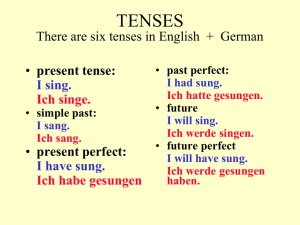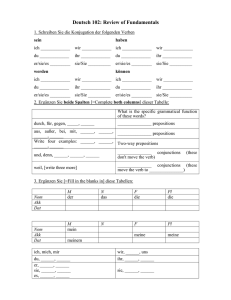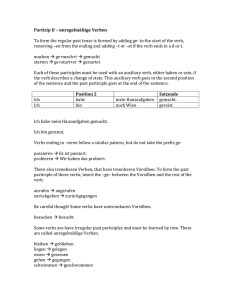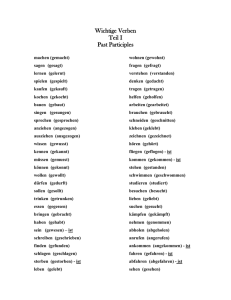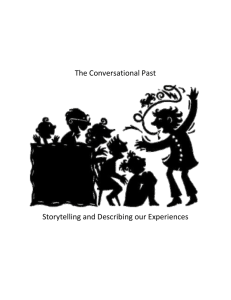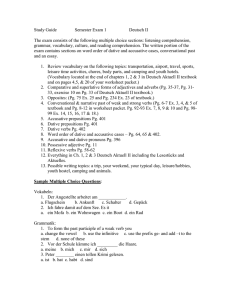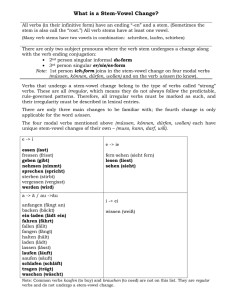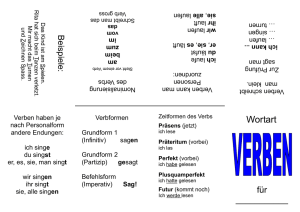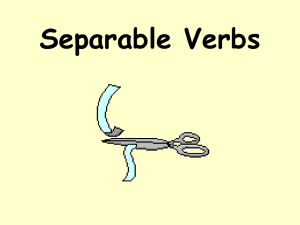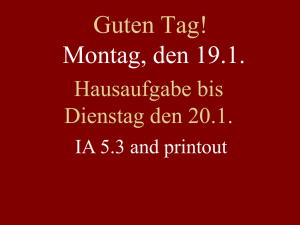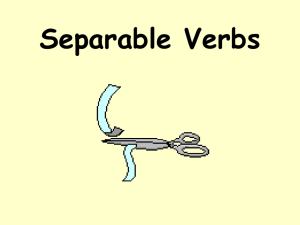A2 – Partizip Perfekt – refresher
Werbung
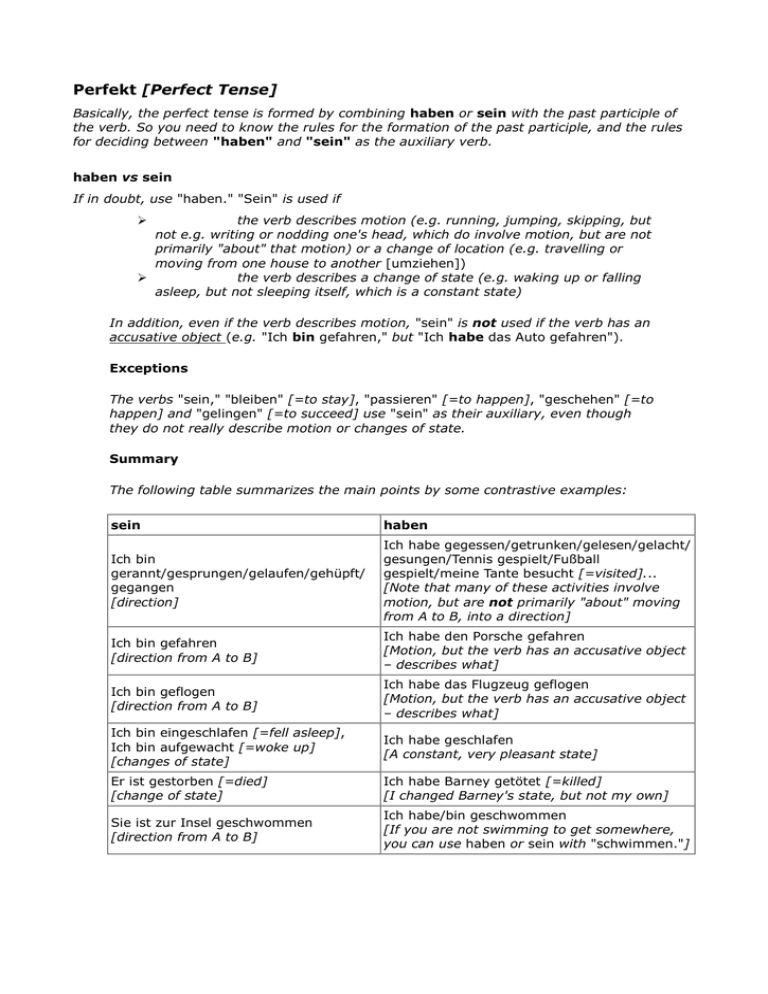
Perfekt [Perfect Tense] Basically, the perfect tense is formed by combining haben or sein with the past participle of the verb. So you need to know the rules for the formation of the past participle, and the rules for deciding between "haben" and "sein" as the auxiliary verb. haben vs sein If in doubt, use "haben." "Sein" is used if the verb describes motion (e.g. running, jumping, skipping, but not e.g. writing or nodding one's head, which do involve motion, but are not primarily "about" that motion) or a change of location (e.g. travelling or moving from one house to another [umziehen]) the verb describes a change of state (e.g. waking up or falling asleep, but not sleeping itself, which is a constant state) In addition, even if the verb describes motion, "sein" is not used if the verb has an accusative object (e.g. "Ich bin gefahren," but "Ich habe das Auto gefahren"). Exceptions The verbs "sein," "bleiben" [=to stay], "passieren" [=to happen], "geschehen" [=to happen] and "gelingen" [=to succeed] use "sein" as their auxiliary, even though they do not really describe motion or changes of state. Summary The following table summarizes the main points by some contrastive examples: sein haben Ich bin gerannt/gesprungen/gelaufen/gehüpft/ gegangen [direction] Ich habe gegessen/getrunken/gelesen/gelacht/ gesungen/Tennis gespielt/Fußball gespielt/meine Tante besucht [=visited]... [Note that many of these activities involve motion, but are not primarily "about" moving from A to B, into a direction] Ich bin gefahren [direction from A to B] Ich habe den Porsche gefahren [Motion, but the verb has an accusative object – describes what] Ich bin geflogen [direction from A to B] Ich habe das Flugzeug geflogen [Motion, but the verb has an accusative object – describes what] Ich bin eingeschlafen [=fell asleep], Ich bin aufgewacht [=woke up] [changes of state] Ich habe geschlafen [A constant, very pleasant state] Er ist gestorben [=died] [change of state] Ich habe Barney getötet [=killed] [I changed Barney's state, but not my own] Sie ist zur Insel geschwommen [direction from A to B] Ich habe/bin geschwommen [If you are not swimming to get somewhere, you can use haben or sein with "schwimmen."] Formation of the past participle Strong [Irregular] vs Weak [Regular] Verbs Past participles of strong [irregular] verbs end in -en. Past particples of weak [regular] verbs end in -t. Past particples of mixed verbs (the 8 or so weak verbs that are nevertheless irregular) also end in -t. [e.g. bringen – (hat) gebracht / rennen – (ist) gerannt] Rules for the "ge-" Normally, "ge-" is placed in front of the past particple: geschlafen, gelacht, gesagt, gesehen... Separable prefix verbs have the "ge" between the prefix and the rest of the verb: ferngesehen, aufgemacht, aufgestanden, mitgekommen... Verbs with inseparable prefixes such as "be-," "ent-," "ver-," and "ge-" do not get a "ge-" in their past participles: bezahlt, entdeckt, verstanden, gefallen... Verbs ending in -ieren are always weak and don't add "ge": studiert, dekoriert, alarmiert... - 'no ge- and end in -t' Summary The following table summarizes the main points regarding the formation of the past participle: "Normal" verbs Separable Prefix Verbs strong [irregular] verbs weak [regular] verbs Sie haben gesehen/ gegessen/geschlafen Du hast gelacht/gesagt/ gearbeitet Wir sind gelaufen/ gegangen/gestorben Du bist gewandert/ gehüpft Er hat mitgenommen/ ferngesehen/ Er hat eingekauft/ abgenommen abgeholt Du bist umgezogen/ weggegangen/ eingeschlafen Sie ist aufgewacht mixed verbs Du hast gebracht/ gekannt/gedacht/ gebracht/gewusst Sie ist gerannt. Er hat mitgebracht Ich bin weggerannt. Wir haben entdeckt/ Ich habe verstanden/ verkauft/übersetzt begonnen/bekommen Wir haben erkannt Inseparable Prefix Verbs Ihr seid entkommen/ entstanden Ihr seid entflammt [=burst into flames/ to kindle sth] Sie haben studiert/ diskutiert/probiert -ieren Verbs Es ist explodiert/ kollidiert Es ist verbrannt If you are not sure – look up the rules above sein and haben Ergänzen Sie die Perfektformen 1. Linda hat vor einem Monat ihren Führerschein gemacht. (machen) 2. Sie ______ letztes Wochenende zu ihrem Freund Felix ____________. (fahren) 3. In Heidelberg ______ sie mit ihrem Auto erst keinen Parkplatz ____________. (finden) 4. Dann ______ sie aber vor Felix Haus einen freien Platz ____________. (sehen) 5. Schnell ______ sie ihr Auto in die Parklücke ____________. (stellen) 6. Felix ______ sich sehr über den Besuch von Linda ____________. (freuen) 7. Nach zwei Stunden ______ Linda wieder ____________. (gehen) 8. An ihrem Auto ______ ein Zettel von der Polizei ____________. (sein) 9. "Sie ______ im Halteverbot ____________." (parken) 10. So ______ Linda einen Strafzettel für falsches Parken ____________. (bekommen) Ergänzungsaufgabe – complementary task bin bin gemacht hat ferngesehen geblieben gefahren gefragt gehabt gelesen geregnet gespielt gespielt habe habe habe haben hast Regen Hallo Alex, du ____ _______ , was ich alles im Sommer schlechtes Wetter Ich ____ , und ich ____ ____ . Leider ____ meistens zu Hause jedoch manchmal mit dem Rad auf den Sportplatz Fußball und Tennis ____ . Wenn es ____ oder am Computer ____ Viele Grüße dein Markus ____ , ____ . wir fast immer . . Dort ____ ich Bücher ____ ich ,
